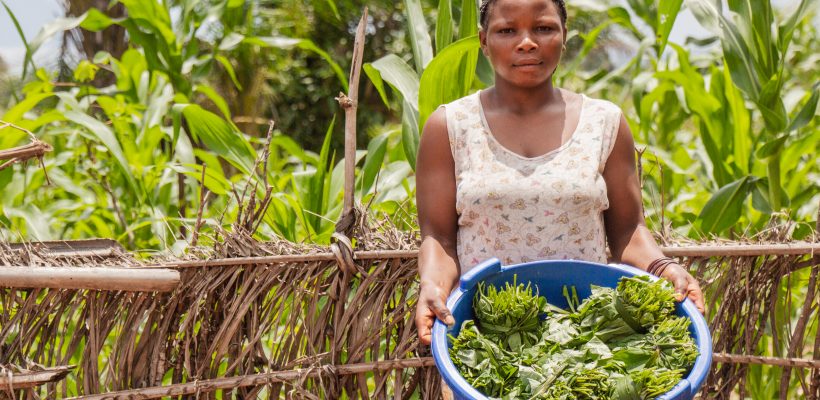As they sit quietly in front of their family’s hut in Congo’s Kasai-Occidental Province, two-year-old twins Kanku and Mbuyi watch a pair of chickens ambling around their feet. Neither of the tiny boys gives chase or swats at the beaks that occasionally peck at their toes. The twins’ small size and lack of energy are even more pronounced when compared to other children in their village who run with big smiles, asking visitors for cookies.
That’s because Kanku and Mbuyi have recently returned home from the local hospital, where they were treated for and continue to recover from severe acute malnutrition. They were fortunate that a neighbor named Ntuite – a community nutrition volunteer trained by the ASSP Project – recognized their symptoms and referred them for immediate treatment. Today, after their hospital stay and regular visits from Ntuite and a nutritionist, they have made significant improvement – but they still have a long way to go.
Helping malnourished children like Kanku and Mbuyi – and preventing malnutrition in the first place – is a critical component of the ASSP Project. According to IMA World Health’s Dr. Larry Sthreshley, Country Director for the Democratic Republic of Congo, between 48 to 60 percent of child deaths in the Congo are related to malnutrition; 11 percent of children under five years old are acutely malnourished, while 43 percent are chronically malnourished.
Meanwhile avocados, moringa, peanuts, bananas, amaranth and other nutritious foods grow well in this part of the Congo. No one, he says, should go hungry.
After examining the twins and making recommendations for their continued care, Dr. Sthreshley explains that an important strategy for combating malnutrition is encouraging gardening at the household level. Rather than inadvertently encouraging the notion that the only treatment for malnutrition is packaged foods brought in from somewhere else, the ASSP Project is employing a greener and more sustainable approach: teaching people how to grow the nutritious foods everyone needs right in their backyards.
Thanks to Ntuite, who is one of nearly 9,000 community volunteers who will be trained in nutrition and gardening through the ASSP Project, Kanku and Mbuyi’s parents learned how to grow matamba plants, which have highly nutritious leaves, in a plot behind their home. Growing the food, however, is only part of the strategy; another critical component is education. After identifying malnourished children and referring them for treatment, Ntuite and his fellow volunteers return to the families every three months to teach them important lessons about keeping their children healthy. He will continue monitoring the twins, reinforcing key nutrition messages with their parents and inspecting the garden to give the boys the best chance at health and survival.
In addition to the network of community volunteers who are working with the families of malnourished children, the health centers are also key players in the push for gardening. Through ASSP, each health center is equipped to provide critical nutrition counseling to expectant mothers well before their children are born. During prenatal checkups, for example, health workers teach mothers about types and amounts of food their children will need to be healthy, and they also provide seeds and guidance for growing that food themselves. If you plant your moringa tree while you’re pregnant, the mothers learn, its nutrient-dense leaves will be ready for picking when your baby is six months old and ready for solid food. In this way, the ASSP Project is striving to stop malnutrition before it has a chance to start.
While the causes of malnutrition in Congo are complex and there’s still work to be done, the ASSP Project’s strategy of empowering health centers and community volunteers to support household gardening is already bearing fruit. And just as crops produce seeds that can be used for next season’s garden, growing food is an important skill that can pass from one generation to the next – contributing to a truly sustainable solution to malnutrition in the Congo.
IMA World Health/Emily Esworthy[/vc_column_text][/vc_column][/vc_row]


Recent Comments